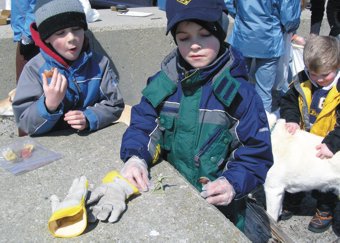
Editor's Notes
Summer: A time to get involved
Printer Friendly Page
 |
PHOTO: SUSAN LLEWELYN LEACH |
Summer marks a time when people enjoy the natural environment. This issue of the Gulf of Maine Times includes stories about the quality of our surroundings and some activities to improve them.
In the article on marine debris, writer Susan Llewelyn Leach talks to scientists and citizens working to clean up a virtual yard sale of debris washed up on beaches: refrigerators, portable toilets, step ladders, tires, children's toys, balloons, batteries, light bulbs, fishing lines, crates, clothes, and shoes. Over the summer look for events in various states and provinces where you can get involved in cleaning up beaches throughout the Gulf of Maine. In another marine-based activity, Kirsten Weir talks about families involved in seeding and growing oysters as part of an oyster restoration project.
Bridie McGreavy, who writes of finding a sense of “place” in the Brownfield Bog, a vast wetland system in Maine's Saco River watershed, reminds us that we can enjoy nature just outside our door.
Other stories, such as the update on toxic pollution in Casco Bay, governing growth, and wastewater treatment in Nova Scotia, discuss forward movement in battling ongoing human impact and pollution problems. The recent trend toward ecosystem-based management may help give a bird's eye view of what we're doing to the environment, and how to improve our behavior.
Kirsten Weir also profiles Rollie Barnaby, who advocates for cooperative research between fishermen and scientists and who believes offshore aquaculture is the next logical step in fish farming.
An update on the Canadian-initiated Gulf of Maine Biodiversity Discovery Corridor reveals some of the secrets of the deep, such as what types of undiscovered species lie below, including deep sea corals.
The story on Susan Shaw, founder of the Marine Environmental Research Institute in Blue Hill, Maine, who recently was named a fellow to the prestigious Explorers Club for her pioneering work documenting the worldwide distribution of persistent organic pollutants in the ocean and their impacts on marine mammals and humans, inspires the scientist in all of us.
Finally, we pay tribute to another pioneer, Ransom Myers, an expert on understanding changes in marine biodiversity related to commercial fishing, who died in March in Halifax, Nova Scotia, after battling brain cancer since last fall.
We hope the subjects in these and other articles will engage your outdoor senses and bring a spirit of discovery to your summer.
-Lori Valigra
© 2007 The Gulf of Maine Times